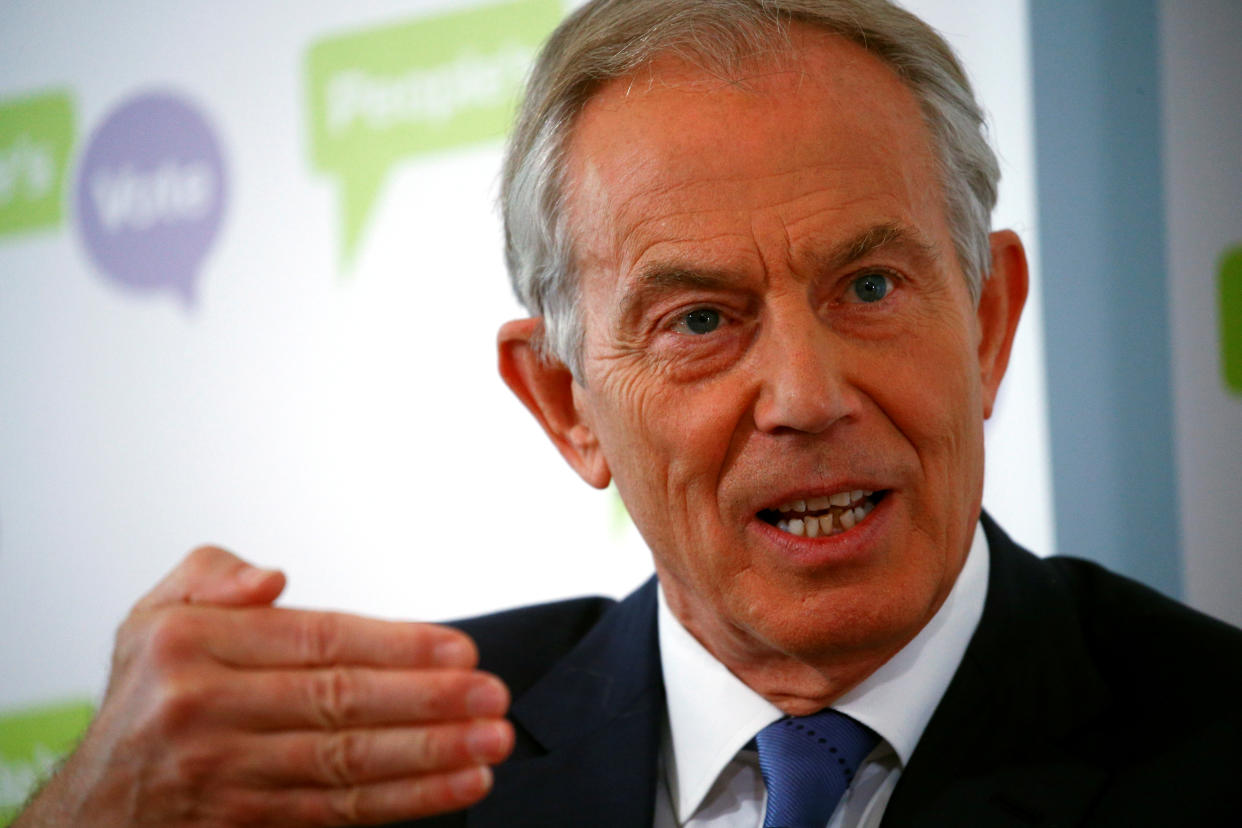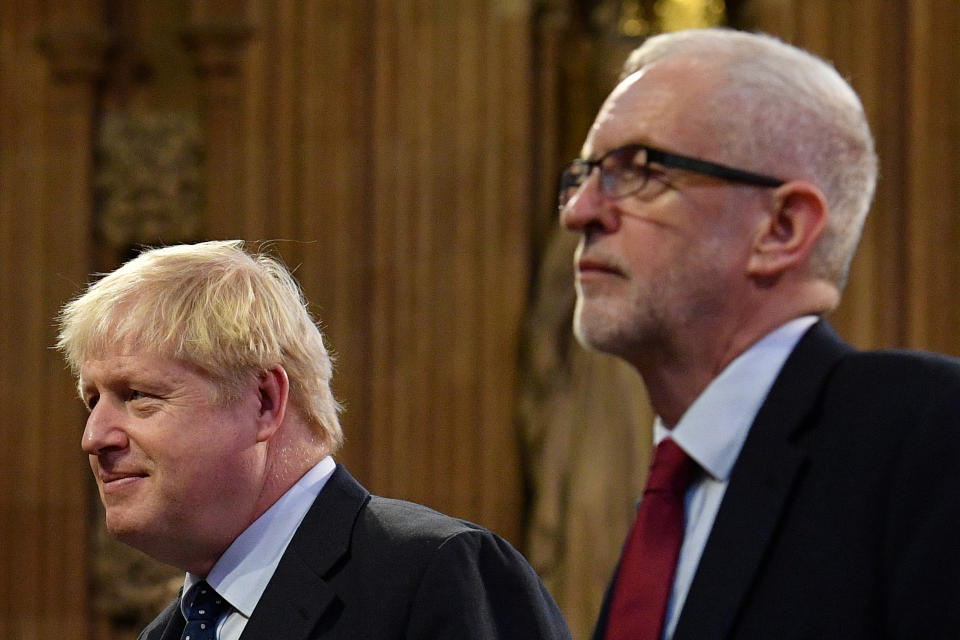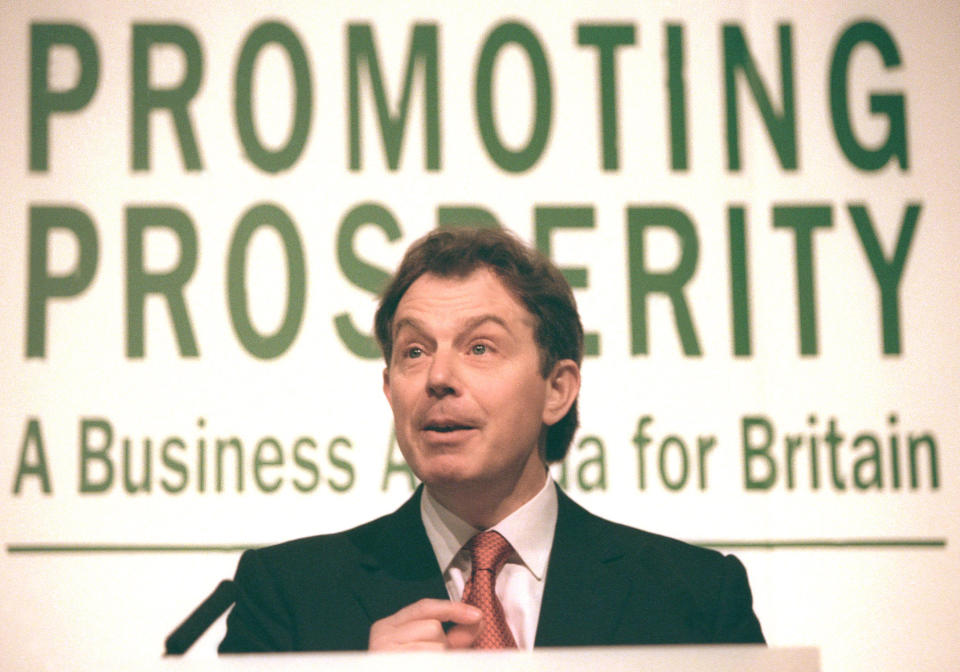Tony Blair on the 'dire state' of British politics, Brexit, and 'extraordinary' election spending plans

“British politics is in a dire state,” Tony Blair says. “It’s deeper than Brexit really.”
The former British prime minister is worried — who isn’t these days?
Brexit is “a historic mistake,” he said when we spoke earlier this week. But he seemed more immediately worried by the looming election.
“Even if you leave aside Brexit, you’re now in this extraordinary situation on public spending where the Conservatives are now just saying we’re going to spend lots of money,” Blair told Yahoo Finance UK. “The Labour party says, whatever you spend, we’re going to spend even more.
“It’s going to be a problem for the next generation.”
‘Someone’s got to pay for it’
Blair sat down with Yahoo Finance UK at Web Summit in Lisbon, Portugal, this week. At 66, the former prime minister is slighter in stature than he was during his days in office, but still has the same energy and charisma that made him such a hit with voters. He sports a pair of Dr Martens’ Chelsea boots during our meeting, a touch of individual flair in an otherwise statesman-like outfit.
The former Labour prime minister, who was in power from 1997 to 2007, was in Lisbon to talk about how technology can tackle inequality, the kind of sweeping, Davos-friendly topic typical at such events. The four-day conference is one of the biggest technology events in the world, attended by over 70,000 people and graced by both tech glitterati and political grandees such as Blair himself.
But more pressing than grandiose visions of the future is figuring out what will happen in Britain in just a few short weeks. Britain is gearing up for what could be a pivotal election on 12 December. It could decide Brexit once and for all by giving Boris Johnson a majority to push through his deal (or not).
Ahead of the crunch vote, the Conservative and Labour parties have both made lavish spending pledges in bid to woo voters. Both sides have announced extra funding for things like hospitals and schools.
The Conservatives have already announced the largest increase in day-to-day government spending in 15 years and Labour this week announced plans for a £150bn social transformation fund.

Blair is alarmed by all this.
“Austerity, having been the policy of the Conservative party for 10 years, is now just literally thrown out the window,” he said. “And the Labour party’s promising large amounts to people that, at some point, someone’s got to pay for it somewhere.”
Think tank the Resolution Foundation said the pledges from both sides mean taxes are likely to rise under either a Labour or Conservative government.
The National Institute of Economic and Social Research and the Institute for Fiscal Studies have both said the government is on track to break its own budget rules. An increase in government borrowing is likely whoever gets in to Downing Street.
Blair is not advocating for austerity or decrying spending in general. But he thinks the policies on both sides are simply short-term, headline-grabbing giveaways designed to win votes.
“I describe this as the infantilising of British politics,” Blair said. “This is just politics. No one is saying: how do we reform the healthcare system, the education system, law and order, or anything. People are just saying: I’m going to spend more, I’m going to spend even more.”
‘You don’t make policy based on opinion polls’
If he were writing a manifesto today, Blair would “put technology at the centre of everything, so it suffuses everything that the government does.”
“Who’s talking about the technological revolution and how it’s going to change the world? They’re not even talking about it,” he said. “And yet that is the thing that’s going to change the world. This is my worry.”
Other ideas include targeted help for declining coastal towns, support for universities — “because they’re the seedbeds of the next generation of industry” — reform of the education and healthcare systems, and an emphasis on law and order — “we’re losing our grip on it actually.”
“A whole range of policies that would make a real difference to people’s lives,” Blair said. “But you won’t find them in the manifestos that are about to come out.”

Blair has been ostracised by the Labour party under Jeremy Corbyn, who has shifted it far further to the left than it ever was under Blair.
Perhaps the most eye-catching Corbyn policy is bringing utilities like the railway, the Post Office, and water supply back under public ownership. The plan has alarmed business leaders and sparked warnings on cost, but some younger voters are energised by the proposals.
Blair thinks Corbyn is simply re-igniting old ideological debates.
“I might as well literally be back in time,” he said. “In the 1970s, we had a policy of re-nationalising the shipbuilding industry, which now seems a completely weird debate. It took up an unbelievable amount of energy.
“Look, I understand why people support nationalisation. But this is my point: you don’t just make policy by reference to what scores in the opinion polls.
“If you spend all your energy on transport and trying to renationalise British Rail, energy, water, and all of those things — OK, but you’re going to be spending a huge amount of time doing that so you better be sure that that’s what’s going to transform the country.”
‘I favour radical policy’
The radicalisation of the Labour party is part of a broader polarisation of politics globally. Both major UK political parties have drifted further towards the extremes in recent years. As a result, the kind of centrist policies that swept Labour to power — neoliberal on economics, progressive on social issues — have become unfashionable.
‘New Labour’ has become a toxic term in Corbyn’s Labour party and Corbynistas use ‘Blairite’ as an insult. Even away from the more militant parts of the Labour party, the Twitter meme of the “centrist dad” has emerged as a way of dismissing seemingly out-of-touch older men who advocate for a politics closer to Blair’s.

“Here’s my thing with these guys,” Blair said. “A lot of people on the left who go on about centrism — if they were winning elections I would say, OK, fair enough guys, you’re doing a great job here. Tell me where the left is in power around the Western world right now? Securely in power? Where?
“What always amazes me is those people who lose elections blame those of us who won them for why they lose them. No, they lose them because they’re not in the right place.”
Centrist isn’t the right word to describe how he thinks about the world now anyway, Blair said.
“I favour radical policy today, but it’s got to be radical based on an analysis of how the world is changing, that’s why I put technology at the heart of it.
“When they say we’re out of touch — I don’t think we are out of touch, which is why, by the way, every time a centre left modern progressive position is on offer it usually wins,” he said. “It’s just not on offer.”
READ MORE: Tony Blair: Facebook should be regulated 'like utilities'
Blair believes there is still a strong appetite for the kind of consensus-building, moderate position he advocates. He has called for tactical voting in the upcoming election to show support for this way of governing. However, it will be increasingly difficult as more and more moderate MPs decide to leave parliament.
Blair himself has said he would have a hard time voting for Labour right now, although he has said he couldn’t realistically vote for any other party.
“There are a lot of people who do not want to see the Conservatives back in power but who, frankly, worry about the leadership of the Labour party,” he said.
Overall, Blair thinks the election is a bad idea.
“We’ve mixed up Brexit with a general election, which we should never have done. It’s in my view a profound mistake. If we end up with a hung parliament out of it, then we’re literally no further forward.”
No compromise on Brexit
Which brings us back to Brexit, the national psychodrama that has engulfed the country for three years and threatens to destabilise peace on the island of Ireland, one of Blair’s greatest achievements as prime minister.
Blair is a vocal critic of Brexit. He has campaigned for a second referendum, believing this is the only way to settle the issue.
“My view’s always been that Brexit’s not just about Brexit,” he said. “In fact, I’m not even sure it’s primarily about Europe. It was a cry of anger against the political establishment, against anxieties over immigration, communities left behind, people left behind by globalisation. I think the years of austerity really impacted this debate as well.”
READ MORE: Tony Blair: 'I’m sorry Philip Hammond is leaving politics'
Brexit Britain in 2019 is a divided place. Blair was a master of consensus building during his time in office but he is downbeat on the prospects of bringing Leavers and Remainers together any time soon.
“I don’t think there is a compromise over Brexit, because a sort of soft Brexit pleases no one in the end,” he said. “In the end, one side is going to be disappointed or pleased.”
How do we start to heal the divide?
“The only way you’re going to bring the country back together is deal with the grievances,” Blair said. “In the end, the trouble with Brexit is that it doesn’t deal with any of the grievances, it actually makes most of them worse.
“What you can compromise over is whatever side ultimately wins this debate has to reach out to the other.”

